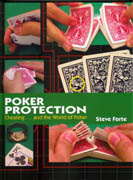
Poker Protection -- Cheating. . . and the World of Poker
Poker Protection -- A Must-Read For Careful Poker Players
As poker accelerates in popularity, millions of new players nationally and internationally are drawn to the live action at the tables and to the Internet. There will always be arguments about rulings Howard Schwartz, the "librarian for gamblers," is the marketing director for Gambler's Book Club in Las Vegas, a position he has held since 1979. Author of hundreds of articles on gambling, his weekly book reviews appear in numerous publications throughout the gaming industry. Howard's website is www.gamblersbook.com on particular hands and there will always be 'crossroaders' trying to cheat or searching for an edge. Few books have been written about how cheaters operate in poker games—less than a handful this century--and there are few authors who are experts in the field.
Howard Schwartz, the "librarian for gamblers," is the marketing director for Gambler's Book Club in Las Vegas, a position he has held since 1979. Author of hundreds of articles on gambling, his weekly book reviews appear in numerous publications throughout the gaming industry. Howard's website is www.gamblersbook.com on particular hands and there will always be 'crossroaders' trying to cheat or searching for an edge. Few books have been written about how cheaters operate in poker games—less than a handful this century--and there are few authors who are experts in the field.
Steve Forte wrote the classic Casino Games Protection three years ago, covering all casino games with a small section on poker. He was asked by many inside and outside the industry to expand that section to a stand-alone book on protecting America’s hottest game, and so, just a week ago, came Poker Protection -- Cheating…and the World of Poker, (360 pages, hardbound, $50). Forte draws a small portion, about 30 pages, of this book from Casino Games Protection, which sells for $200, and adds more than 300 more pages to this vital resource.
Casinos have long neglected poker as a game that needed surveillance because it was not the house, but the player money that was at stake. Now, with the growth of multi-million dollar tournaments and the eyes of the world watching on TV, with many corporate sponsors nervously following the action, it behooves all involved to keep the action honest and above-board at all times.
Forte explains how cheaters operate today and the history of the game and how the grifters operated a century ago. The chapter discussing tournament play, the chance of collusion; how final table deals may occur and the often heard term “chip dumping” along with deliberate slow play should alert novice players, inexperienced supervisors or tournament organizers what might devastate their casino or reputation.
Those puzzled about random number generators (RNGs), which is the “core of every online poker hand,” will understand it all much better after Forte explains it, including an explanation of how serious security issues surfaced in 1999. (How, for instance, was one group able to dissect one site’s technology to predict the hole cards of all players and what cards would hit on fourth and fifth street.)
Forte is not bashing poker. In fact, in an overall optimistic tone, he lauds those watching and organizing the game live and on the Internet for their diligence in keeping the action clean and honest for the most part.
For those still more comfortable playing home games, he supplies a valuable checklist of items to consider before sitting down in someone’s home, in a private game or at a fraternal organization. Included are location and game environment, who’s running the game, how long the game has been running, if there’s a house dealer, who are the other players, the importance of watching the shuffle, cut and deal, watching the discards and protecting your hand. Finally—ask who supplied the playing cards; what kind are they and were the cards removed from a sealed box in front of the players.
There are some short, but illuminating sections on the history of poker and the evolution of many of the games, including some of the most popular ones played today for big money.
The book should steer you away from trouble games, make you more alert to potential scamsters and their ploys and should be in the hands of supervisors, dealers, gaming enforcement personnel in every state and in every nation where honesty and integrity go hand in hand.
Illustrated with many black and white photos and indexed so you may isolate some particular concept or subject quickly, the book is well-priced and has larger than expected print size.